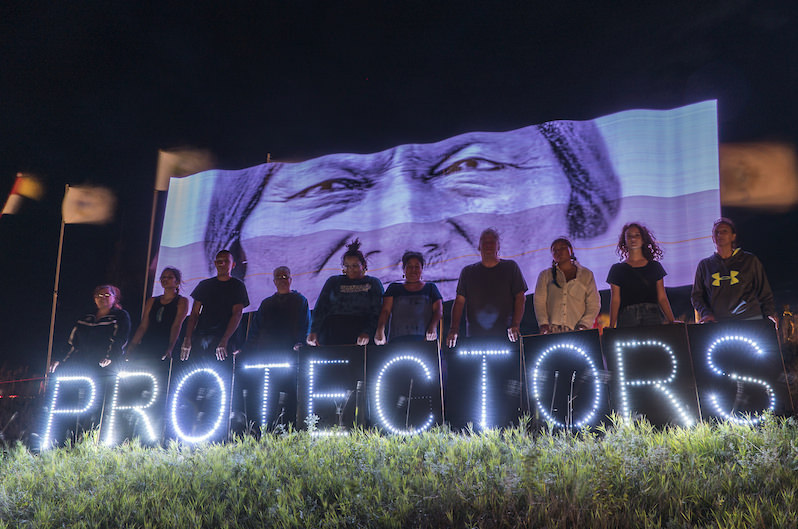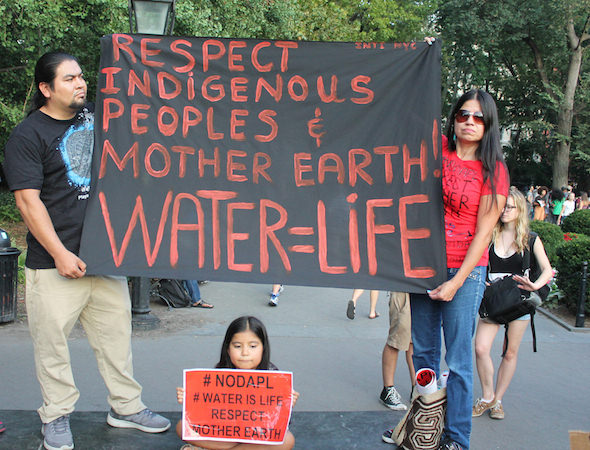Indigenous Peoples Day Is Observed in Many Cities as Fight for Native American Rights Intensifies
As a movement against Columbus Day gains support, protesters face down riot police at the Dakota Access pipeline construction site.
By Nika Knight / Common Dreams

Demonstrators in New York City show support for the Standing Rock Sioux. (Joe Catron / CC 2.0)
As the movement to abolish Columbus Day and replace it with Indigenous Peoples Day finds success in communities from Phoenix, Arizona, to the state of Vermont, the battle for Indigenous rights in the face of industrial development rages on.
In North Dakota, 27 Indigenous water protectors were arrested in Monday’s action to peacefully occupy a Dakota Access Pipeline construction site. The arrests at the hands of militarized police came less than a day after a federal court of appeals ruled against the Standing Rock Sioux’s request for an emergency injunction against the controversial pipeline project.
Meanwhile, on Alcatraz Island, a sunrise ceremony saw hundreds gather to honor the culture of Indigenous peoples and express solidarity with the fight against Dakota Access.
“I don’t want to be complacent so I show up every time there is an event for my people,” one Indigenous participant told Fusion.
The scenes of Indigenous solidarity and the battle against the pipeline were ever more resonant as many parts of the country celebrated Columbus Day, which honors the arrival of Christopher Columbus to the Americas. To many Indigenous people, Columbus was a harbinger of centuries of slaughter.
Yet the battle for Indigenous rights is gaining traction and visibility: with each passing year, more and more places are abolishing Columbus Day and celebrating Indigenous Peoples Day in its place.
“Indigenous Peoples Day represents a shift in consciousness,” Dr. Leo Killsback, a citizen of the Northern Cheyenne Nation and assistant professor of American Indian Studies at Arizona State University, told CNN. “It acknowledges that Indigenous peoples and their voices are important in today’s conversations.”
And this year saw Vermont Governor Peter Shumlin, a Democrat, proclaim Monday Indigenous Peoples Day, which followed similar proclamations from officials in Phoenix, Arizona; Denver, Colorado; Cambridge, Massachusetts, and Santa Fe, New Mexico, among nine other U.S. locales.
“One of the biggest misconceptions about Columbus is that he was righteous. The truth is that he was wicked and responsible for the rape and murder of innocent Indigenous people,” Killsback, who pushed for Indigenous Peoples Day in Phoenix, added to CNN.
Meanwhile, activists continue to push for the federal government and public schools to stop celebrating Christopher Columbus: “If we are sincere in our claim that all lives have value,” writes author and high school teacher Bill Bigelow, “then schools need to refuse to honor the first European colonialist of the Americas, the ‘father of the slave trade.'”
“This is not about what went on 500 years ago,” Bigelow adds. “It’s about what’s going on today: an inspiring struggle for rights and dignity.”
Your support matters…Independent journalism is under threat and overshadowed by heavily funded mainstream media.
You can help level the playing field. Become a member.
Your tax-deductible contribution keeps us digging beneath the headlines to give you thought-provoking, investigative reporting and analysis that unearths what's really happening- without compromise.
Give today to support our courageous, independent journalists.






You need to be a supporter to comment.
There are currently no responses to this article.
Be the first to respond.